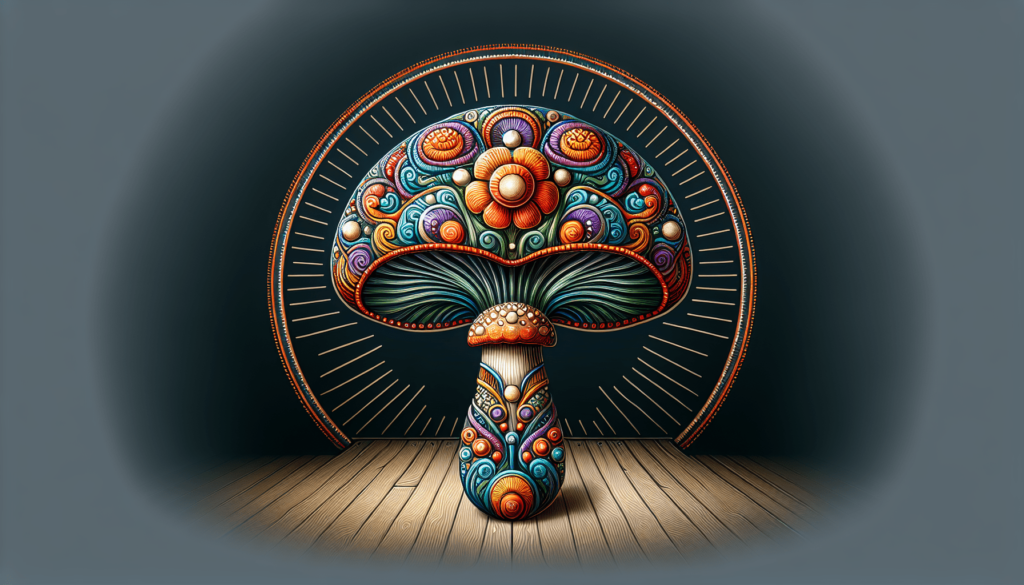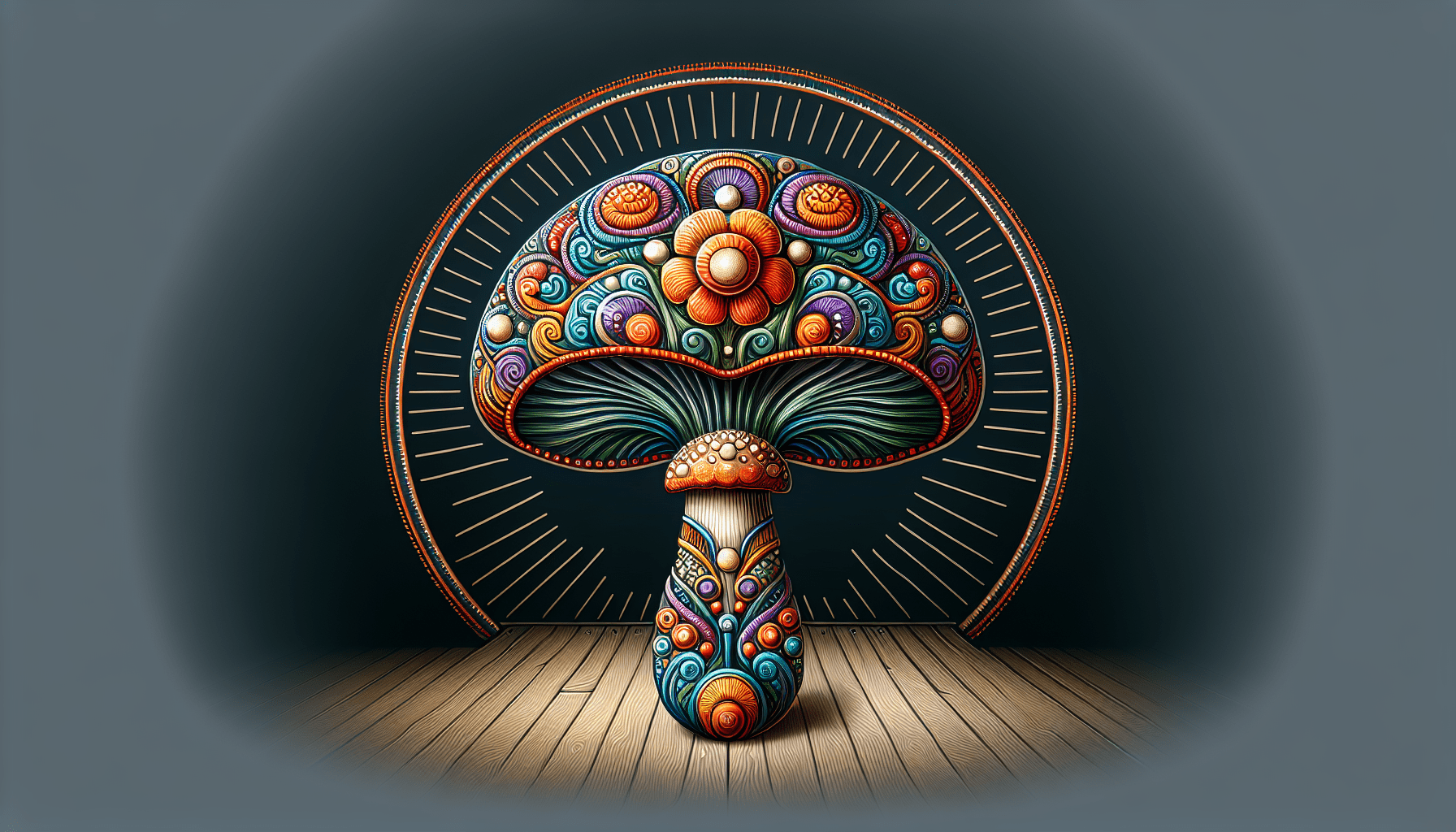Have you ever wondered what you can do to support your brain health? Look no further than the fascinating world of medicinal mushrooms. These incredible fungi have been used for centuries in traditional medicine and are now gaining recognition for their potential benefits on brain health. From Lion’s Mane to Reishi, these mushrooms are packed with antioxidants, immune-boosting compounds, and even cognitive-enhancing properties. So, whether you’re looking to improve memory, focus, or overall cognitive function, incorporating medicinal mushrooms into your routine might just be the natural solution you’ve been searching for.
Understanding Medicinal Mushrooms
What are medicinal mushrooms?
Medicinal mushrooms are a specific category of fungi that possess beneficial properties for human health. These mushrooms have been used for centuries in traditional medicine practices around the world. They contain various bioactive compounds that have been found to promote wellness and support the body’s natural functions. While there are numerous species of medicinal mushrooms, each with their unique set of health benefits, they are primarily known for their positive effects on brain health.
Types of medicinal mushrooms
There are several types of medicinal mushrooms that have been extensively studied for their brain-boosting properties. Some of the most popular ones include Lion’s Mane, Reishi, Chaga, Cordyceps, and Turkey Tail. Each of these mushrooms has its distinct characteristics and benefits, making them suitable for addressing various brain health concerns.
History of medicinal mushroom use
The use of medicinal mushrooms can be traced back thousands of years. Ancient civilizations in Asia, Europe, and the Americas valued these mushrooms for their healing properties. Traditional Chinese medicine, for instance, has a long history of incorporating medicinal mushrooms as a vital component of herbal remedies. The knowledge and use of medicinal mushrooms have been passed down through generations, and today, modern science is shedding light on the wisdom of our ancestors by confirming the therapeutic potential of these remarkable fungi.
Benefits of Medicinal Mushrooms for Brain Health
Enhanced cognitive function
Medicinal mushrooms have shown to enhance cognitive function by promoting the growth and development of neurons. Compounds found in these mushrooms support the production of nerve growth factors, such as brain-derived neurotrophic factor (BDNF), which plays a crucial role in the formation and maintenance of healthy brain cells. By stimulating neuronal growth, medicinal mushrooms can improve memory, concentration, and overall cognitive performance.
Improved memory and concentration
One of the key benefits of medicinal mushrooms is their potential to enhance memory and concentration. The bioactive compounds found in these mushrooms have been shown to protect brain cells from oxidative stress and inflammation, both of which can impair cognitive function. By reducing these damaging effects, medicinal mushrooms support optimal brain health, allowing for improved memory retention and enhanced focus.
Reduced inflammation
Chronic inflammation in the brain has been linked to various neurological disorders, including Alzheimer’s disease, Parkinson’s disease, and multiple sclerosis. Medicinal mushrooms possess anti-inflammatory properties that can help reduce inflammation in the brain, thereby potentially lowering the risk of developing these conditions. By combating inflammation, these mushrooms provide a protective effect on brain health.
Boosted immune system
A healthy immune system is vital for overall well-being, including brain health. Medicinal mushrooms have been found to possess immunomodulatory properties, meaning they can regulate and strengthen the immune system. By supporting immune function, these mushrooms help protect the brain from infections, oxidative damage, and age-related decline. A robust immune system promotes a healthy environment for optimal brain function.
Antioxidant properties
Medicinal mushrooms are rich in antioxidants, compounds that neutralize harmful free radicals in the body. Free radicals can cause oxidative stress, which is known to contribute to age-related cognitive decline and neurological disorders. By scavenging these free radicals, medicinal mushrooms help reduce oxidative stress and protect brain cells from damage. The antioxidant properties of these mushrooms are essential for maintaining brain health and preventing the onset of cognitive decline.

Popular Medicinal Mushrooms for Brain Health
Lion’s Mane
Lion’s Mane (Hericium erinaceus) is a unique mushroom that resembles a lion’s mane, hence its name. This mushroom has gained popularity for its potential nootropic properties, meaning it may enhance cognitive performance. Lion’s Mane contains compounds, such as hericenones and erinacines, that have been shown to stimulate the production of nerve growth factors, leading to increased neuronal growth and improved brain function. Research has indicated that Lion’s Mane may have benefits for memory, concentration, and overall mental clarity.
Reishi
Reishi (Ganoderma lucidum) is an iconic mushroom that has been revered for millennia as the “Mushroom of Immortality.” It has a glossy reddish-brown cap and a woody texture. Reishi is known for its ability to support the immune system, alleviate stress, and promote relaxation. These qualities indirectly contribute to brain health by reducing inflammation and oxidative stress, which are common culprits in cognitive decline. The bioactive compounds in Reishi, such as triterpenoids and polysaccharides, have been the subject of scientific research, suggesting their potential to support brain health and overall well-being.
Chaga
Chaga (Inonotus obliquus) is a mushroom that grows on birch trees in cold regions. It has a distinctive black, charcoal-like appearance. Chaga is perhaps best known for its powerful antioxidant properties. It contains a high concentration of antioxidants, including melanin, polyphenols, and triterpenoids, which help combat oxidative stress and free radicals in the body. By reducing inflammation and oxidative damage, Chaga may offer significant benefits for brain health. Clinical studies have shown promising results regarding its potential to support cognitive function and protect against neurodegenerative diseases.
Cordyceps
Cordyceps (Cordyceps sinensis) is a unique mushroom that grows in the high altitudes of the Himalayas. It has a long history of use in traditional Chinese and Tibetan medicine. Cordyceps is known for its adaptogenic properties, meaning it helps the body adapt to stressors and maintain a state of balance. When it comes to brain health, Cordyceps has been shown to improve oxygen utilization, leading to increased energy and endurance. Additionally, it exhibits neuroprotective effects, helping to shield brain cells from damage caused by oxidative stress and inflammation. Animal and human studies have demonstrated the potential of Cordyceps in supporting cognitive function and combating age-related cognitive decline.
Turkey Tail
Turkey Tail (Trametes versicolor) gets its name from the striking resemblance its fan-shaped cap bears to a wild turkey’s colorful tail feathers. This mushroom has been traditionally used for its immune-boosting properties. A strong immune system is vital for brain health, as it helps protect against infections and inflammation. Turkey Tail is rich in polysaccharopeptides, compounds that have been shown to modulate the immune response and enhance the activity of natural killer cells. These immune-modulating effects may have a positive impact on brain health, potentially reducing the risk of cognitive decline. Clinical trials investigating the benefits of Turkey Tail for brain health are ongoing.
Methods of Consuming Medicinal Mushrooms
Dried mushroom extracts
Dried mushroom extracts are a popular and convenient way to consume medicinal mushrooms. These extracts are derived from the fruiting bodies or mycelium of the mushrooms and can be found in various forms, such as powders, capsules, or tinctures. Dried mushroom extracts offer a concentrated dose of the beneficial compounds found in medicinal mushrooms and can be easily incorporated into a daily routine.
Powders and capsules
Medicinal mushroom powders and capsules are another common method of consumption. These products are made by grinding or pulverizing dried mushrooms into a fine powder, which can then be encapsulated or added to foods and beverages. Powders and capsules provide a convenient way to incorporate medicinal mushrooms into the diet, allowing for precise and consistent dosing.
Tinctures and teas
Tinctures and teas are traditional methods of consuming medicinal mushrooms. Tinctures are made by soaking the mushrooms in a solvent, such as alcohol or water, to extract the beneficial compounds. Teas are prepared by steeping dried mushroom slices or powders in hot water. These liquid forms of medicinal mushrooms offer a pleasant and soothing way to enjoy their benefits.
Cooking with mushrooms
Cooking with fresh or dried medicinal mushrooms is a flavorful and nutritious way to incorporate them into your diet. Mushrooms can be sautéed, grilled, baked, or added to soups, stews, and stir-fries. Their earthy taste and unique texture make them a versatile ingredient in various dishes, allowing you to enjoy their brain-boosting benefits while indulging in delicious meals.
Combination products
Combination products, such as mushroom blends or supplements, offer a convenient way to experience the benefits of multiple medicinal mushrooms. These products often combine different mushroom species to provide a broad spectrum of nutrients and bioactive compounds. Combination products can be found in various forms, such as powders, capsules, or tinctures, and offer a holistic approach to supporting brain health.

Conclusion
Incorporating medicinal mushrooms into your lifestyle can have a profound impact on brain health. From enhancing cognitive function and memory to reducing inflammation and supporting the immune system, these remarkable fungi offer a myriad of benefits. Choosing the right mushroom for your needs depends on your specific brain health goals and preferences. Whether it’s Lion’s Mane for nootropic properties, Reishi for immune support, Chaga for its antioxidant effects, Cordyceps for increased energy, or Turkey Tail for immune modulation, each mushroom brings unique qualities to the table. With the various methods of consumption available, including dried mushroom extracts, powders and capsules, tinctures and teas, cooking, and combination products, it’s easy to incorporate medicinal mushrooms into your daily routine. Discover the wonders of these natural allies and unlock the potential of optimal brain health with medicinal mushrooms.
